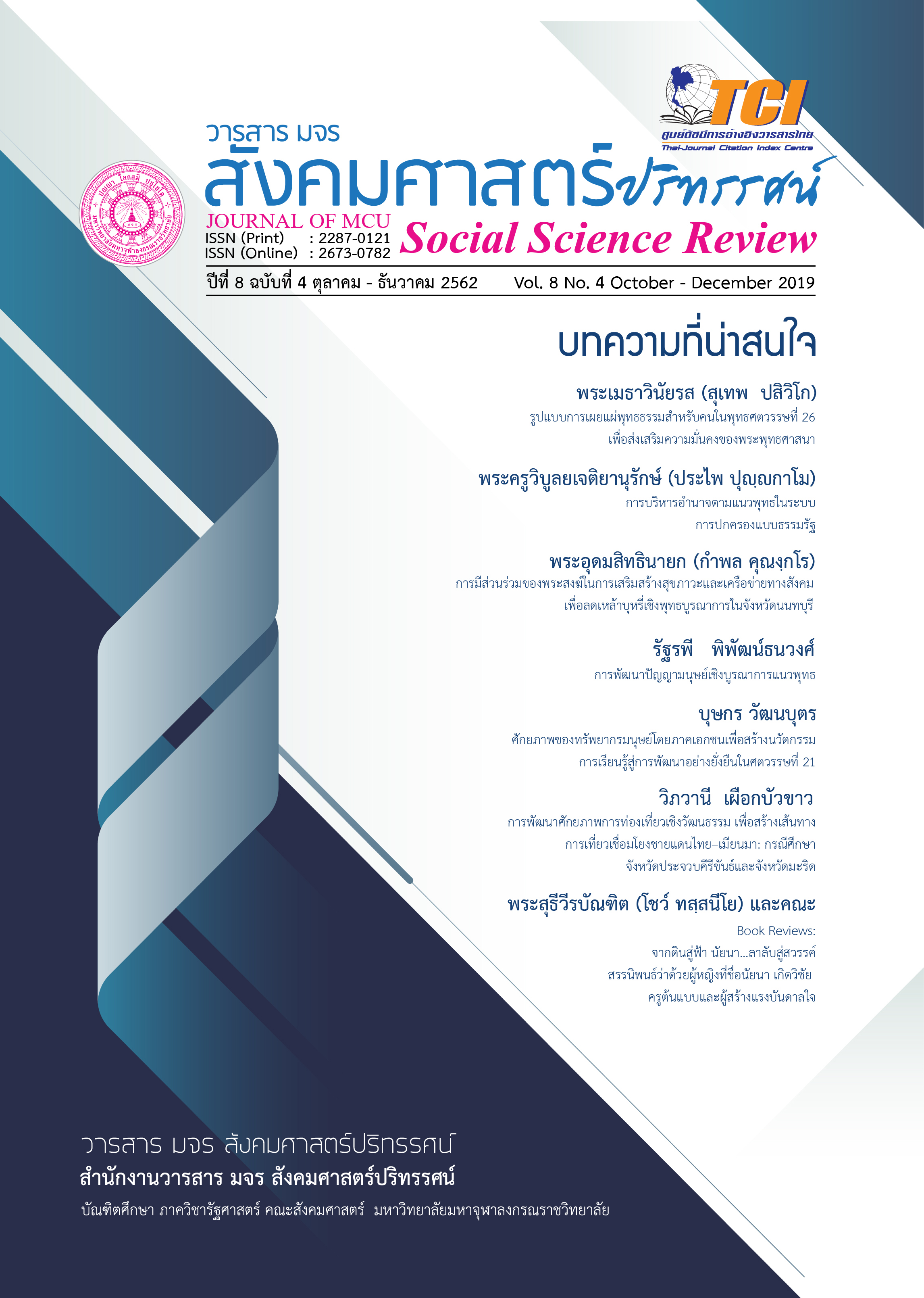กลไกการจัดการด้านสวัสดิการสังคมที่เหมาะสมของผู้สูงอายุ : กรณีศึกษาผู้สูงอายุใน ตำบลสุเทพ อำเภอเมืองเชียงใหม่ จังหวัดเชียงใหม่
คำสำคัญ:
กลไกการจัดการ, สวัสดิการ, ผู้สูงอายุบทคัดย่อ
บทความนี้มีวัตถุประสงค์โครงการวิจัย 1) เพื่อศึกษารูปแบบ และวิธีการจัดสวัสดิการสังคมผู้สูงอายุของเทศบาลตำบลสุเทพ 2) เพื่อศึกษาทราบความคิดเห็นของผู้สูงอายุ ด้านการจัดสวัสดิการสังคมที่ตนได้รับ 3) เพื่อเป็นข้อเสนอแนะแนวทางการจัดสวัสดิการสังคมผู้สูงอายุที่เหมาะสม และบังเกิดประโยชน์สุข โดยใช้การวิจัยเชิงคุณภาพและเชิงปริมาณ ได้แก่ การสัมภาษณ์เจาะลึก การใช้แบบสอบถาม และการใช้เทคนิค SWOT กับกลุ่มตัวอย่างของเทศบาลตำบลสุเทพ อำเภอเมืองเชียงใหม่ จังหวัดเชียงใหม่ จำนวน 117 คน ประกอบด้วย กลุ่มผู้บริหาร ข้าราชการประจำส่วนท้องถิ่น คณะกรรมการชมรมผู้สูงอายุ และกลุ่มผู้สูงอายุ ผลการวิจัยมีดังนี้
ผลการศึกษารูปแบบและวิธีการจัดสวัสดิการสังคมผู้สูงอายุของเทศบาลตำบลสุเทพ พบว่า กลุ่มผู้สูงอายุ มีจัดสวัสดิการสังคมสาหรับผู้สูงอายุ 4 รูปแบบ คือ การประกันสังคม (Social Security) การช่วยเหลือสาธารณะ (Public Assistance) การบริการสังคม (Social Service) และการช่วยเหลือเกื้อกูลของภาคประชาชน (The Assistance of People Sector) นอกจากนี้จากการศึกษาพบว่า การจัดสวัสดิการสังคมผู้สูงอายุยังมีปัญหาและอุปสรรคหลายประการ เช่น เบี้ยยังชีพไม่เพียงพอ กองทุนช่วยเหลือผู้สูงอายุที่ยากจนหรือพิการ กองทุนชุมชน โครงการให้ความช่วยเหลือผู้สูงอายุที่ประสบปัญหาทางสังคม การจัดตั้งศูนย์อบรมหรือโรงเรียนผู้สูงอายุประจำหมู่บ้าน การมีงานทำและการมีรายได้ การจัดกิจกรรมด้านนันทนาการ ความเข้มแข็งของชมรมผู้สูงอายุ การประชุมของชมรมผู้สูงอายุ การมีส่วนร่วมของชมรมผู้สูงอายุ การสำรวจประวัติผู้สูงอายุ การตรวจรักษาพยาบาลเบื้องต้น การดูแลผู้สูงอายุที่ช่วยตนเองไม่ได้ อาสาสมัครสวัสดิการสังคมในหมู่บ้าน ซึ่งปัญหาเหล่านี้มีเหตุปัจจัยมาจาก 1) ขาดการบูรณาการและขาดความต่อเนื่องในการดำเนินงานด้านสวัสดิการผู้สูงอายุมีการแยกส่วนกันทำงานระหว่างงานด้านสุขภาพกับงานด้านสังคม และมีการรวมศูนย์ในการให้ความช่วยเหลือ ควรมีการกระจายความรับผิดชอบให้หน่วยงานในท้องถิ่นเข้าร่วมแสดงบทบาทให้มากขึ้น 2) ขาดการนำนโยบายสู่การปฏิบัติอย่างแท้จริง 3) ความไม่พร้อมของงบประมาณและการขาดแคลนบุคลากรที่มีความรู้ความสามารถในด้านผู้สูงอายุโดยตรง และ 4) สวัสดิการสังคม เช่น เบี้ยผู้สูงอายุ ที่รัฐจัดให้กับผู้สูงอายุยังไม่เพียงพอกับความต้องการของผู้สูงอายุ ไม่สามารถตอบสนองปัญหาได้อย่างแท้จริงและไม่ครอบคลุมผู้สูงอายุได้ทั้งหมด
ผลการศึกษาแนวทางการจัดสวัสดิการสังคมผู้สูงอายุที่เหมาะสม พบว่า 1) ด้านการประกันสังคม ควรมีการปรับเพิ่มเบี้ยยังชีพให้สูงขึ้น โดยพิจารณาตามความเหมาะสมกับค่าใช้จ่ายในปัจจุบัน การตั้งกองทุนสำหรับผู้สูงอายุ 2) ด้านการช่วยเหลือสาธารณะ ควรมีการสำรวจประวัติผู้สูงอายุในแต่ละหมู่บ้าน และควรมีอาสาสมัครประจำชุมชน 3) การบริการสังคม ควรจัดให้มีการตรวจสุขภาพให้สม่ำเสมอและต่อเนื่อง การอบรมให้ความรู้ด้านสุขภาพแก่ผู้สูงอายุ และการจัดกิจกรรมนันทนาการให้แก่ผู้สูงอายุได้แสดงบทบาทด้านประเพณีวัฒนธรรม และ 4) การช่วยเหลือจากภาคประชาชน ควรส่งเสริมให้ผู้สูงอายุเข้าร่วมกิจกรรมกลุ่มอย่างสม่ำเสมอ และสนับสนุนชมรมผู้สูงอายุมีความเข้มแข็ง โดยการบูรณาการจากหลายภาคส่วนทั้งภาครัฐ ภาคเอกชน และภาคประชาชน เพื่อรองรับจำนวนผู้สูงอายุที่มีจำนวนเพิ่มมากขึ้นเรื่อย ๆ ทั้งนี้เพื่อมุ่งเน้นให้ผู้สูงอายุมีคุณภาพชีวิตที่ดีและเป็นผู้มีคุณค่าต่อสังคมและประเทศชาติต่อไป
เอกสารอ้างอิง
Institute of Geriatric Medicine. (2005). Guidelines for the Establishment and
Operation of the Geriatric Clinic, Bangkok: Department of Medical Services, Ministry of Public Health.
Jirawattana Klaharn. (2015). Guidelines for the Development of Social Welfare for the Elderly, Conference and Research Presentation National and international 6, April 28-29, 2012, Bangkok: Suan Sunandha Rajabhat University.
Morakot Singhakachen. (1999). Evaluation of welfare allowance for the elderly from Department of Public Welfare, Bangkok: Office of Social Development and Human Security.
Napaporn Chayowan. (1988). The results of the research project on socio-economic and demographic effects of the elderly in Thailand, Institute of Demography Chulalongkorn University.
Nalinee Lochingchairit. (2006). Evaluation of social welfare performance on elderly subsistence allowances. Case study of Chiang Mai municipality. Chiangmai Province, Independent Study Report on Master Degree in Public Administration Graduate School, Chiang Mai University.
Office of the National Economic and Social Development Board. (2005). Strategic Framework for the Preparation of Thai Society for the Elderly, Bangkok: Office of the Prime Minister.
Pornprom Chaipum and Pornnee Sirichot. (2011). Welfare Requirements for the Elderly of Non Thai District Municipality, Non Thai District, Nakhon Ratchasima Province, Journal of the Humanities and Social Sciences.
Sasiphat Yodphet. (2011). Guidelines for Social Welfare Services for the Elderly, Institute of Thai Studies, Thammasat University,
Sudarat Sudsomboon. (2014). Social welfare of the elderly in Thailand. Southern Journal of Technology. 7 (1),1-15.
Wiphawan Prajoabmoa. (2012). Annual Report of the Thai Elderly Age 2012, College of Population Studies Chulalongkorn University and the Foundation for Thai Elderly Research and Development Institute, Nonthaburi: SS Plus Media Company Limited,.
ดาวน์โหลด
เผยแพร่แล้ว
รูปแบบการอ้างอิง
ฉบับ
ประเภทบทความ
สัญญาอนุญาต
ลิขสิทธิ์ (c) 2019 วารสาร มจร สังคมศาสตร์ปริทรรศน์

อนุญาตภายใต้เงื่อนไข Creative Commons Attribution-NonCommercial-NoDerivatives 4.0 International License.
เพื่อให้เป็นไปตามกฎหมายลิขสิทธิ์ ผู้นิพนธ์ทุกท่านต้องลงลายมือชื่อในแบบฟอร์มใบมอบลิขสิทธิ์บทความให้แก่วารสารฯ พร้อมกับบทความต้นฉบับที่ได้แก้ไขครั้งสุดท้าย นอกจากนี้ ผู้นิพนธ์ทุกท่านต้องยืนยันว่าบทความต้นฉบับที่ส่งมาตีพิมพ์นั้น ได้ส่งมาตีพิมพ์เฉพาะในวารสาร มจร สังคมศาสตร์ปริทรรศน์ เพียงแห่งเดียวเท่านั้น หากมีการใช้ภาพหรือตารางหรือเนื้อหาอื่นๆ ของผู้นิพนธ์อื่นที่ปรากฏในสิ่งตีพิมพ์อื่นมาแล้ว ผู้นิพนธ์ต้องขออนุญาตเจ้าของลิขสิทธิ์ก่อน พร้อมทั้งแสดงหนังสือที่ได้รับการยินยอมต่อบรรณาธิการ ก่อนที่บทความจะได้รับการตีพิมพ์ หากไม่เป็นไปตามข้อกำหนดเบื้องต้น ทางวารสารจะถอดบทความของท่านออกโดยไม่มีข้อยกเว้นใดๆ ทั้งสิ้น





